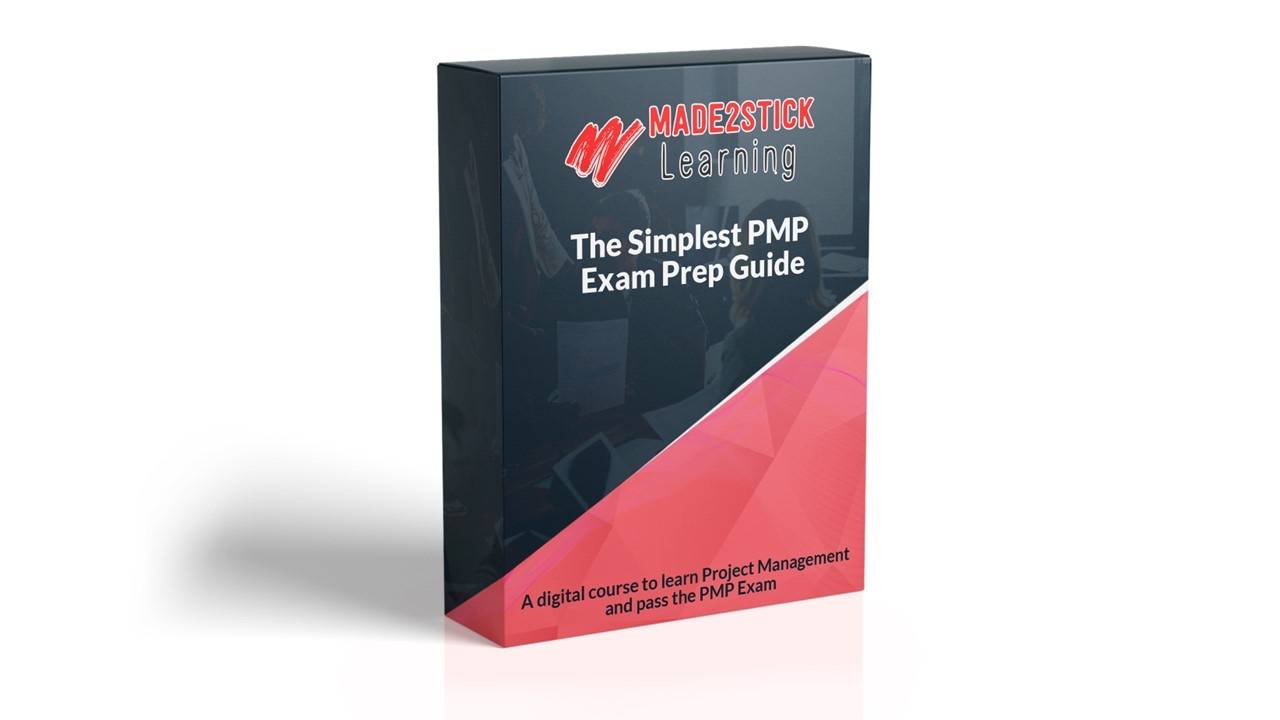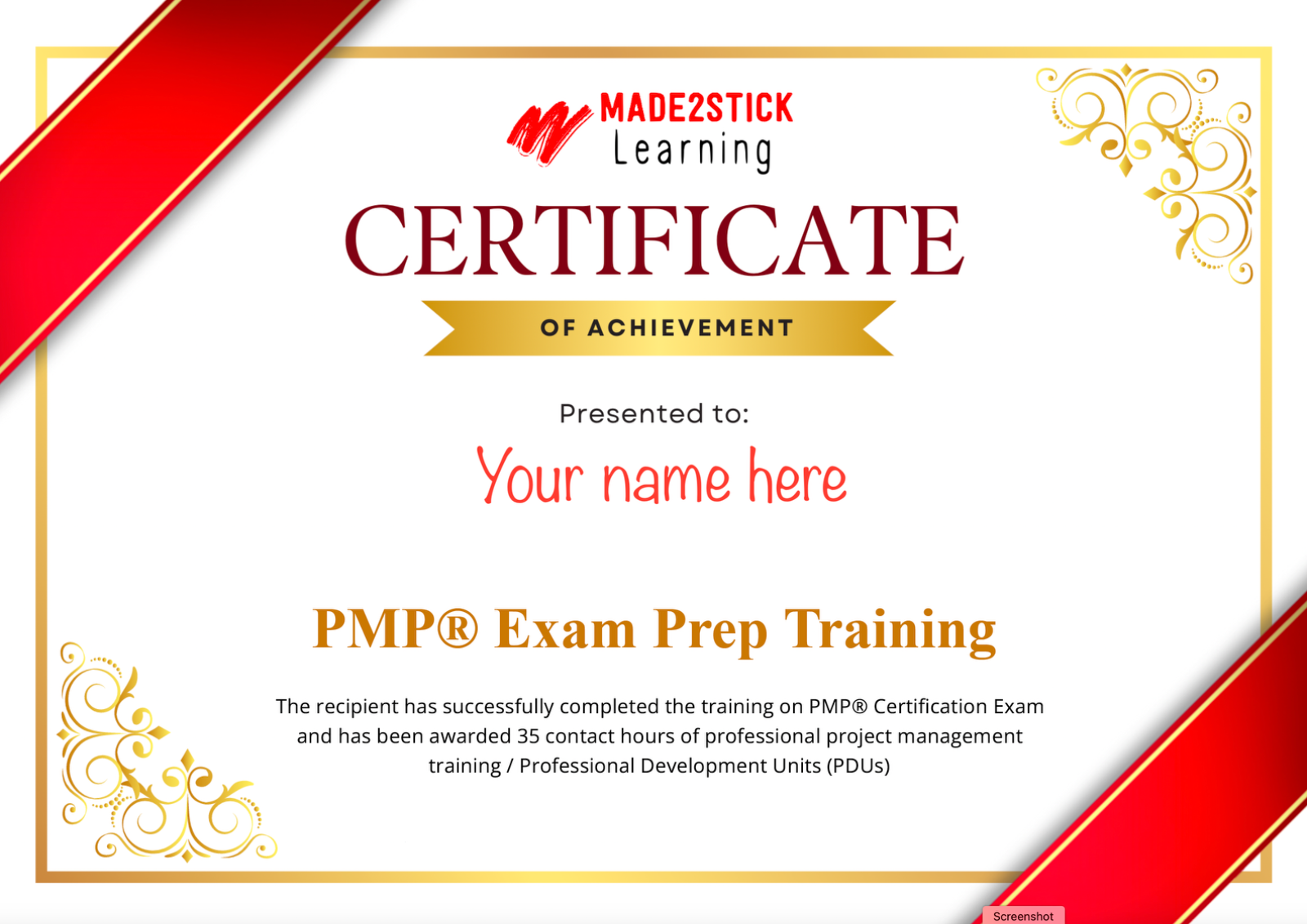The Simplest PMP Exam Prep Guide
Master Project Management and Ace the PMP Certification Exam | Fully updated for the PMI-PMP Certification Exam | Based on PMBOK 6th, 7th Editions and the Agile Practice Guide

Why You Should take this course
-
Covers topics from PMBOK Guide 6th Edition, PMBOK Guide 7th Edition, Agile Practice Guide
-
Pass the PMP Certification Exam in your first attempt by spending just 35 hours of training
- Benefit from interactive and visual approach to learning, with lots of visuals and clear instructions
- Learn to create an agile environment using Scrum and deliver projects in an Agile way
- Learn to manage projects in the most intuitive of ways using potent and unique techniques revealed in this training
This course includes...
4.9 RATING
Over 1000 students world-wide have taken this course
4+ HOURS ON-DEMAND VIDEO
Starting with the fundamentals, the lectures cover the full extent of SAS programming concepts
15 ASSIGNMENTS, 5 QUIZZES
Sharpen your skills with our extensive practice resources ! You will have ample resources to practice and learn.
1 PRACTICE EXAM
Practice with 400+ situational questions to test your knowledge
LIFETIME ACCESS
All the course content is yours to keep for life. That means there is no need to rush through the course.
COURSE COMPLETION CERTIFICATE
Receive a course completion certificate that you can post on your social media.
more about the course
Welcome to the PMP Certification Exam Preparation course! This course is designed to help you pass the Project Management Professional (PMP) exam on your first try.
Relevant and up-to-date content
- Course Content is up-to-date as per the latest PMP Exam content outline
- The content is based on the following three guides upon which the PMP exam is based:
- PMBOK 6th edition:
- Project Integration Management: This knowledge area covers the processes that ensure the various elements of the project are properly coordinated.
- Project Scope Management: This knowledge area covers the processes that ensure that the project includes all the work required, and only the work required, to complete the project successfully.
- Project Time Management: This knowledge area covers the processes required to manage the timely completion of the project.
- Project Cost Management: This knowledge area covers the processes required to manage the budget for the project.
- Project Quality Management: This knowledge area covers the processes required to ensure that the project will meet the required quality standards.
- Project Resource Management: This knowledge area covers the processes required to manage the human resources and other resources needed to complete the project.
- Project Communications Management: This knowledge area covers the processes required to manage the communication needs of the project.
- Project Risk Management: This knowledge area covers the processes required to identify, assess, and manage risks to the project.
- Project Procurement Management: This knowledge area covers the processes required to acquire goods and services from external suppliers.
- Project Stakeholder Management: This knowledge area covers the processes required to identify, assess, and manage the interests and expectations of the stakeholders of the project.
- PMBOK 7th edition
- System of Value Delivery
- 12 Principles of Project Management
- Performance Domains
- Agile Practice Guide
- Introduction to Agile: This section provides an overview of agile principles and values, as well as the benefits of using agile approaches in project management.
- Agile Frameworks: This section describes the most common agile frameworks, including Scrum, Lean, and Kanban, and provides guidance on how to choose the right framework for a specific project.
- Creating an Agile Environment: This section covers the specific practices that are commonly used in agile projects, such as user stories, iterative development, and continuous delivery.
- Delivering in an Agile Environment: This section describes the tools and techniques that are commonly used in agile projects, including agile planning tools, agile estimation techniques, and agile metrics.
- Agile Roles and Responsibilities: This section defines the roles and responsibilities of the various team members in an agile project, including the product owner, the development team, and the Scrum Master.
- Implementing SCRUM through 10 easy steps - a Practical Example.
Downloadable Resources
- Download the PMP Exam Prep Resource Guide eBook as accompanying slides and notes. Use it for quick reference to the lectures, make your own notes on top of this, or use them as presentation slides wherever you want !
- As you navigate through the course lectures, you will find many resources in the Resource Link as downloadable templates that you can use on your projects
- Ready-to-use project document templates that you can download and use on your projects right away (Eg. Project Charter, Project Plan, Risk Register
Earn a Certificate
When you finish listening to all videos, assignments, quizzes and practice exams, you'll earn a Certificate awarding you 35 contact hours of professional project management education that you can use to apply for the PMP exam. You can also share with prospective employers and your professional network.
Interactive and visual approach
- Throughout the course, you will be exposed to a variety of learning methods. The accompanying resource guide has all the slides and notes, and lots of white space for you to take your own notes, doodle and draw.
- The course is designed to be highly interactive, with lots of visuals and clear instructions to help you remember the key concepts.
Practice Exams and Quizzes
- Practice Exam based on actual exam-like scenario-based questions (180 questions)
- Numerous Quizzes after each section

